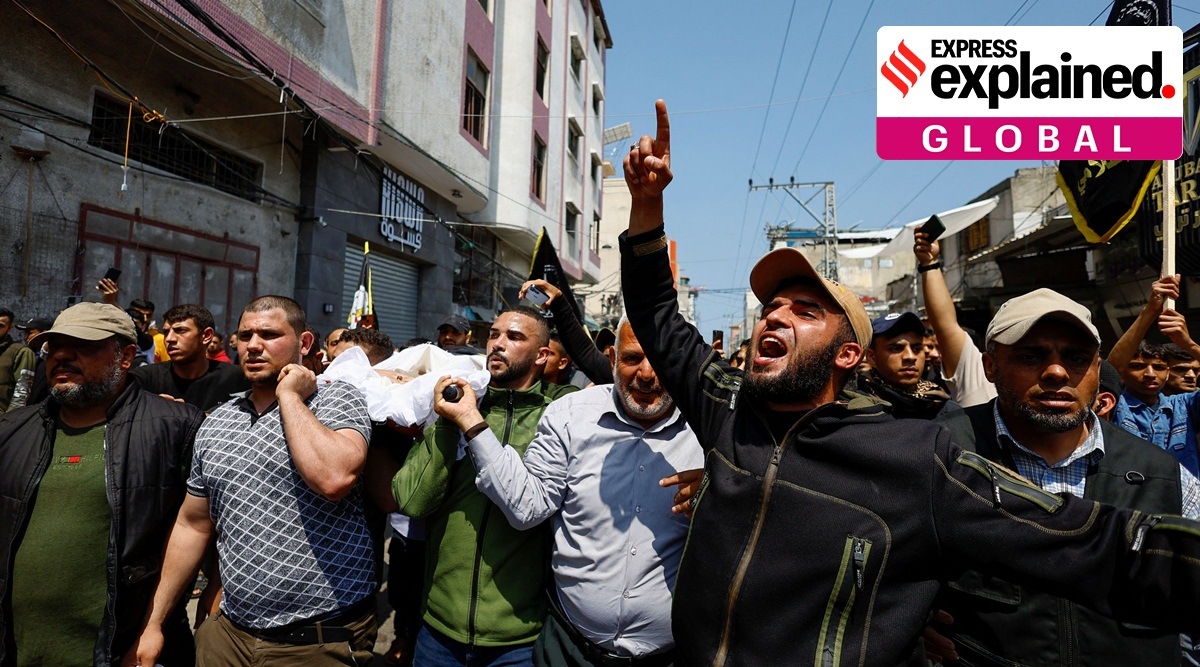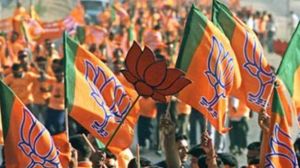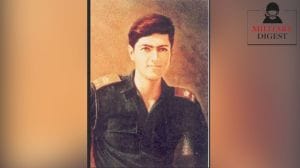Israel’s Foreign Minister will rush back from India, what’s happening?
Israeli warplanes have struck Gaza to take out commanders of the militant Islamic Jihad group. A new wave of Israeli-Palestinian tensions and violence could follow.
 Mourners carry the body of senior Palestinian Islamic Jihad commander Khalil Al-Bahtini, who was killed in an Israeli strike, during his funeral in Gaza City, May 9, 2023. (REUTERS/Mohammed Salem)
Mourners carry the body of senior Palestinian Islamic Jihad commander Khalil Al-Bahtini, who was killed in an Israeli strike, during his funeral in Gaza City, May 9, 2023. (REUTERS/Mohammed Salem) Israeli Foreign Minister Eli Cohen, who arrived in India on Tuesday (May 9) morning on a three-day visit, is flying back to Tel Aviv within hours, cutting short his trip. He was scheduled to fly out from Mumbai on May 11; however, he will return later on Tuesday after meeting Prime Minister Narendra Modi. The sudden change in his plan has been forced by developments in Gaza, according to reports.
Productive and wide-ranging discussions with Foreign Minister @elicoh1 of Israel this afternoon.
The main pillars of our Strategic Partnership – Agriculture, Water, Defence & Security – are taking our ties forward. New agreements in water & agriculture today underline the… pic.twitter.com/CPAdcBuYEw
— Dr. S. Jaishankar (@DrSJaishankar) May 9, 2023
What has happened in Gaza?
Air strikes by Israel in the Gaza strip have killed 13 Palestinians. Three of them are commanders of the militant group Islamic Jihad. The other 10 — three women and four children — are civilians. They are reported to be family members of the militant commanders. Another 20 people are injured.
This is perhaps the single deadliest Israeli attack in Palestinian territory over the last year of heightened tensions between the two sides. The number of Palestinians killed in Israeli raids in this year alone has now surpassed 100.
Most of the Israeli attacks over the last few months have focussed on the West Bank, but since May 2, it has last week, Israel has conducted strikes in Gaza, a stronghold of Hamas, is response to a barrage of rocket fire from the Strip, so called because it is a narrow strip of 140 sq miles of Palestinian territory located in southwest Israel, along the Mediterranean Sea coast.
The Gaza Strip is densely populated, crammed with about 2 million Palestinians. It shares a border with Egypt to the south. The Hamas-ruled territory has been blockaded by Israel for nearly 15 years. The far bigger West Bank is on Israel’s eastern border, along the bank of the Jordan river.
How did the Gaza violence erupt?
The rocket attack from Gaza started after the death in Israeli custody of Khader Annan, reported to be a former spokesman of the Islamic Jihad. He died after 87 days of being on a hunger strike.
Tuesday’s predawn attack by the Israeli Defence Forces (IDF) called Operation Shield and Arrow was carried out by 40 fighter jets and attack helicopters. The IDF said they had hit 10 Islamic Jihad targets, including sites where rockets and other weapons were being manufactured.
Who exactly are the Islamic Jihad?
Formally known as the Palestinian Islamic Jihad, the group also goes by several other names: al-Quds Brigades, Harakat al-Jihad al-Islami fi Filistin, Islamic Jihad Palestine, Islamic Jihad-Palestine Faction, and Islamic Holy War.
The group was established in 1981 as an offshoot of the Egyptian Sunni Islamist group Muslim Brotherhood. Its two founders, both Palestinian members of the Brotherhood, broke away from it believing it was too moderate, and created Islamic Jihad as a militant group focussed only on the liberation of Palestine.
Unlike Hamas, which has a civilian political wing that has contested elections and governs Gaza, Islamic Jihad has no political wing, and is not interested in politics or a two-state solution. It is simply an armed group that has stockpiles of rockets and guns.
The declared goal of Islamic Jihad is to militarily liquidate Israel and establish an Islamic republic in the territory of Palestine as it existed before 1948, when Israel was created.
Even though it is a Sunni group, the Islamic Jihad has strong links to Shia Iran. It is based in Beirut, Lebanon, and Damascus, Syria, and is said to receive funding from Iran, and to maintain close ties with the Iranian Revolutionary Guards Corps (IRGC) and the Shi’ite group Hezbollah.
Who were the commanders killed in the Israeli strike?
According to Islamic Jihad, the commanders killed were Jihad Shaker Al-Ghannam, secretary of the Military Council in the al-Quds Brigades, and also its commander in chief; Khalil Salah al Bahtini, commander of the Northern Region in the al-Quds Brigades; and Tariq Muhammad Ezzedine, one of the leaders of the military wing of the al-Quds Brigades in the West Bank.
The IDF said the 62-year-old Ghannam was a senior member of the Islamic Jihad’s rocket force. It described Bahtini as “an imminent threat to the security of Israeli civilians”, and said Ezzedine was in charge of coordination with the group’s operatives in the West Bank and planning attacks on Israeli civilians there.
So, what happens here onward?
Islamic Jihad, which has the highest number of fighters in Gaza after Hamas, has sworn revenge for the Israeli strikes. Tensions could escalate more significantly if Hamas decides to back the Islamic Jihad. A strong cycle of violence in the region could follow.
- 01
- 02
- 03
- 04
- 05






































